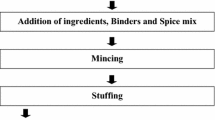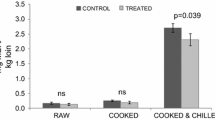Abstract
Danish Landrace× Danish Yorkshire female pigs were fed either a standard diet or a standard diet enriched with 6% rapeseed oil and supplemented with increasing amounts of vitamin E (0, 100 or 200 mg all-rac-α-tocopheryl acetate/kg feed) and copper (0, 35 or 175 mg CuSO4/kg feed), and the effect of dietary regimen on the oxidative stability of (1) frozen-stored raw pork chops packed in atmospheric air, (2) chill-stored pre-frozen pork chops packed in atmospheric air, and (3) freezer-stored, vacuum-packed pre-cooked sausages was investigated. The addition of 6% rapeseed oil did not influence the oxidative stability of the pork chops negatively, whereas the oxidative stability of a product such as the pre-cooked sausages (Danish dinner sausages) with a higher fat content (15%) decreased as a result of rapeseed oil feeding. Inclusion of rapeseed oil in the diets increased the amount of monounsaturated fatty acids and polyunsaturated fatty acids (PUFAs) in the meat and fat for the production of sausages at the expense of the content of the saturated fatty acids, and the higher content of PUFAs readily explains the decreased oxidative stability of the pre-cooked sausages. Feeding pigs 100 mg or 200 mg all-rac-α-tocopheryl acetate/kg feed significantly increased the oxidative stability of the pork chops and the detrimental effect of rapeseed oil observed in the pre-cooked sausages was effectively neutralised by both levels of vitamin E supplementation. Supplementation with copper did not affect the oxidative stability of any of the products. The presented results show that it is possible to produce pork products with a nutritionally improved fatty acid profile by inclusion of 6% rapeseed oil, without affecting the oxidative stability of the products negatively, through the protection provided by dietary vitamin E.
Similar content being viewed by others
Author information
Authors and Affiliations
Additional information
Received: 23 March 1998 / Revised version: 28 May 1998
Rights and permissions
About this article
Cite this article
Jensen, C., Skibsted, L. & Bertelsen, G. Oxidative stability of frozen-stored raw pork chops, chill-stored pre-frozen raw pork chops, and frozen-stored pre-cooked sausages in relation to dietary CuSO4, rapeseed oil and vitamin E. Z Lebensm Unters Forsch 207, 363–368 (1998). https://doi.org/10.1007/s002170050346
Issue Date:
DOI: https://doi.org/10.1007/s002170050346




